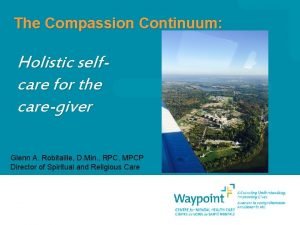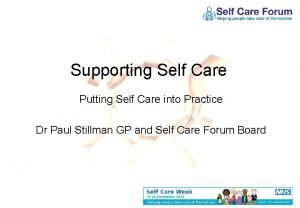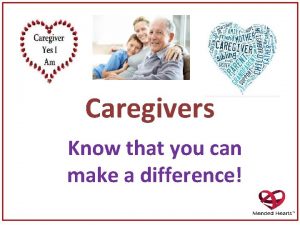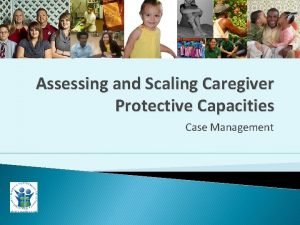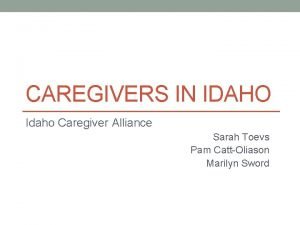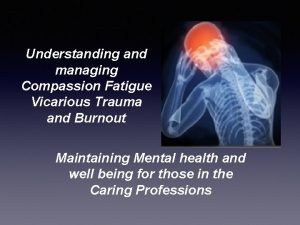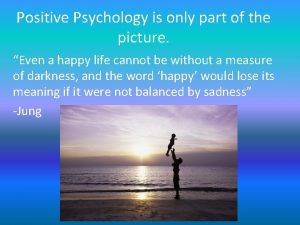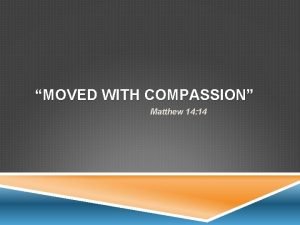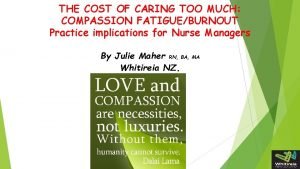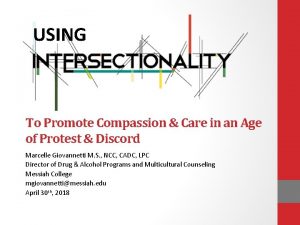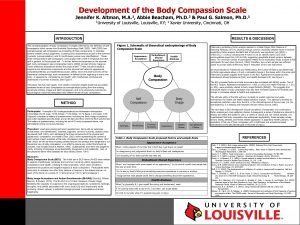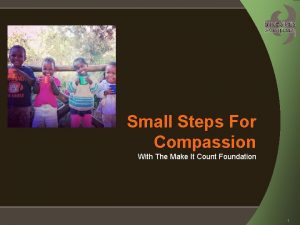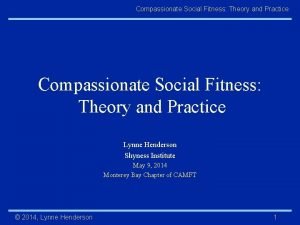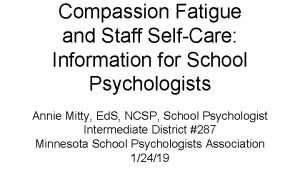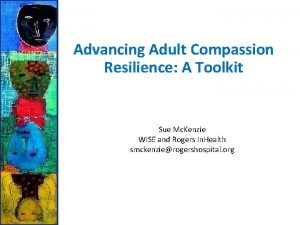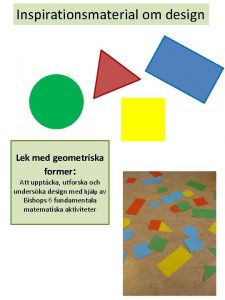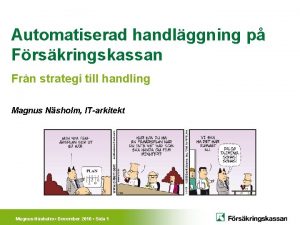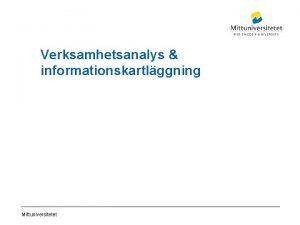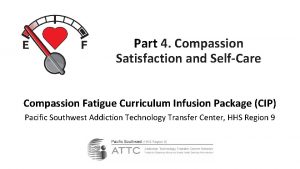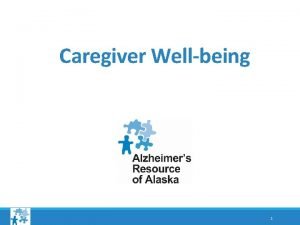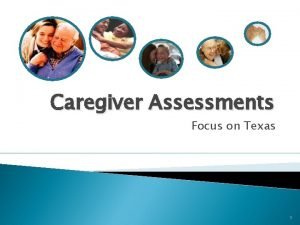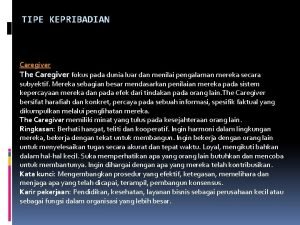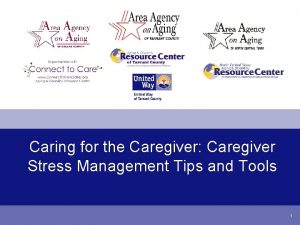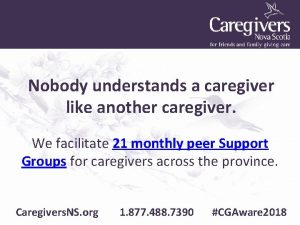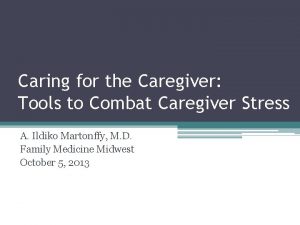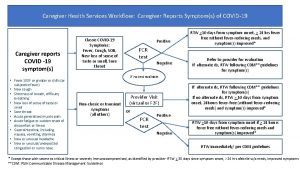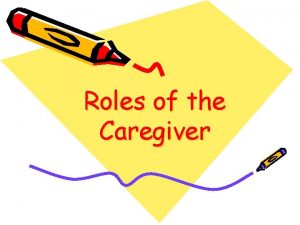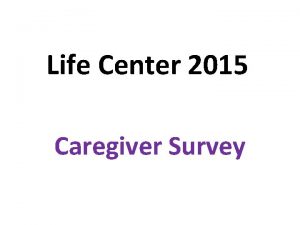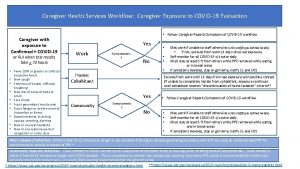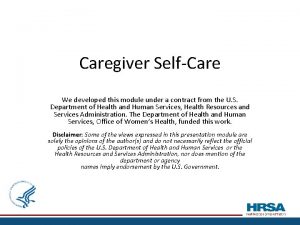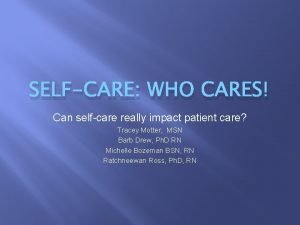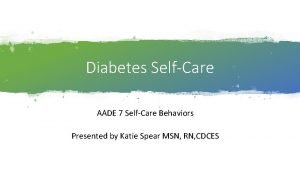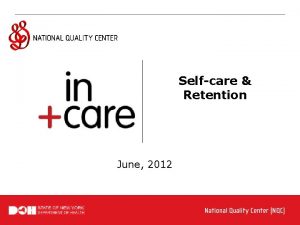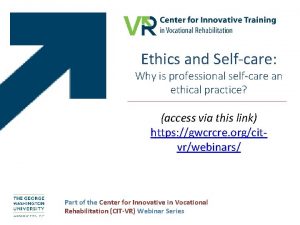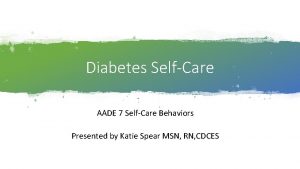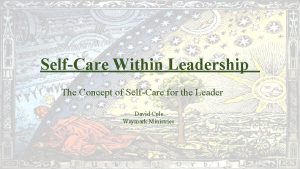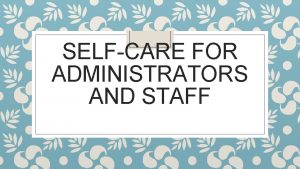The Compassion Continuum Holistic selfcare for the caregiver







































































- Slides: 71

The Compassion Continuum: Holistic selfcare for the care-giver Glenn A. Robitaille, D. Min. , RPC, MPCP Director of Spiritual and Religious Care

Who will benefit from this presentation? • Professional care-providers 2/23/2021 2

Who will benefit from this presentation? • Professional care-providers • Those who are thrust into care provision 2/23/2021 3

Who will benefit from this presentation? • Professional care-providers • Those who are thrust into care provision • Those looking to improve their self-care toolbox 2/23/2021 4

Who Becomes a Care-giver? • Some through unavoidable circumstances: – Accidents – Births – Life transitions

Who Becomes a Care-giver? • Some through personal choice: – The caring professions – Volunteers

Who Becomes a Care-giver? • People who are compassionate

Who Becomes a Care-giver? Compassion: A feeling of deep sympathy and sorrow for another who is stricken by misfortune, accompanied by a strong desire to alleviate the suffering » Dictionary. com

Compassion: A double edged sword! It takes a chunk out of you!

The Role of Stress • General Stress: Ø Both eustress and distress Ø Ongoing Ø Can increase sugar levels, anxiety, etc. o Example: Going on a date; being late to an appointment General Stress Relaxed 2/23/2021 10

The Role of Stress • Extreme Stress: Ø Both eustress and distress Ø Less frequent Ø Elevated autonomic response (rapid heart beat, perspiration, etc. ) o Example: Having to speak in front of a crowd; being yelled at by an agitated person Extreme Stress 2/23/2021 11

The Role of Stress • Trauma/Acute Stress Reaction: Ø “Trauma refers to experiences or events that by definition are out of the ordinary in terms of their overwhelming nature. They are more than merely stressful – they are also shocking, terrifying, and devastating to the victim, resulting in profoundly upsetting feelings of terror, shame, helplessness, and powerlessness. ” (Courtois, 1999) 2/23/2021 12

The Role of Stress • Trauma/Acute Stress Reaction: Ø Overwhelming stress Ø Exceptional Ø Accelerated autonomic response (rapid heart beat, perspiration, etc. ); coping capacities overwhelmed; concentration impaired; general effect on the sphincters of the body; tunnel vision, etc. o Example: Extreme violence, injury, death Trauma Extreme Stress 2/23/2021 13

The Role of Stress • Vicarious Trauma: Ø Taking on the effects of trauma to another Ø Ongoing Ø Any of the preceding… Trauma Vicarious Trauma Person #1 Person #2 Extreme Stress Relaxed 14

The Role of Stress • Cumulative Stress: Ø Residual stress compiling from stressful events, circumstances Ø Ongoing Ø Anxiety, depression, anhedonia Taxed coping capacities Stress Relaxed 2/23/2021 15

The Role of Stress • Post-traumatic Stress: Ø Delayed stress response to trauma Ø Ongoing Ø Anxiety, panic, hypervigilence 2/23/2021 16

Stress Graph Traumatic Stress Extreme Stress General Stress Post-traumatic Stress Cumulative Stress Relaxed Static Level of Stress Glenn A. Robitaille 2/23/2021 17

The Compassion Continuum Sympathy Empathy Glenn A. Robitaille

The Compassion Continuum Sympathy Empathy A relationship between persons in which the condition of one induces a parallel or reciprocal condition in another. -- Dictionary. com

The Compassion Continuum Sympathy Empathy Identification with and understanding of another's situation, feelings, and motives. -- dictionary. com

The Compassion Continuum Sympathy Empathy The ideal zone Caring Understanding

When Compassion Overloads • Compassion Fatigue • Burn-out

Establishing a Baseline Wellness -----Compassion Fatigue-----Burnout

When Compassion Overloads • COMPASSION FATIGUE – Cumulative stress stemming from long term exposure to the suffering and/or trauma of others • Early warning sign of potential burn-out • Normal relationships and duties rob us of energy • Performance is decreased – (anhedonia)

When Compassion Overloads • BURN-OUT – A state of physical, emotional and mental exhaustion caused by unchecked cumulative stress resulting in significant coping impairment • Symptoms occur at the physical, emotional and spiritual levels • Performance is impaired at all levels—relationally, vocationally, sexually, socially

Compassion Fatigue A condition that must not be ignored

Watershed Moments • • Encounters with death Experiences of violence Irreconcilable realities The introduction of suffering

What is Suffering? • To feel pain or distress; sustain loss, injury, harm, or punishment • To tolerate or endure evil, injury, pain, or death • To appear at a disadvantage: comparative - dictionary. com

So the question is…

So the question is… • …how does it affect you to experience pain or distress, loss, injury, harm, or the active animosity of those for whom you provide care? • In the moment • In the hours that follow • In the next week or month You are the instrument…

Creating Self-Awareness “Your vision will become clear only when you look into your heart. Who looks outside, dreams; who looks inside, awakens. ” Carl Jung

Three things we can expect

Three things we can expect • Pain/discomfort • Confusion • Challenges (positive and negative)

Essentials for Working with the Suffering • Self-awareness in the sense of having started to come to grips with one’s own vulnerability – one can never be fully self-aware, but the issue of our vulnerability needs to be on the table

Essentials for Working with the Suffering • An understanding of the grief process and an holistic appreciation of suffering – Empathy, rather than sympathy

Adapted from: Hammers/Thomas Ellis, M. A. , L. M. F. T. Author of This Thing Called Grief Loop What do I have left? Loss • Decreased Socialization • No new friendships • Bland expression • Absent spontaneity • Urge to recover what was lost Integration Detachment Apathy Indifference Loss of interest Desire to withdraw/ give up Shock Confusion Denial Anger at Self/others Lowered Selfesteem Agony Grief Anguish Depression Despair Protest • Crying • Pain • Weakness • Nausea • Loss of Appetite • Sleep Disruption • Other trauma related symptoms due to increased cortisol and adrenalin • Slowed thinking and actions • Continuing physical symptoms

Essentials for Working with the Suffering • Effective listening skills and the ability to respond appropriately – Sometimes, the appropriate response is silence – Validation techniques

Essentials for Working with the Suffering • A commitment to openness/receptiveness to the suffering person and to working with families, if appropriate – The suffering need people who care around them, not detached professionals

Essentials for Working with the Suffering • A knowledge of one’s own personal limits, limits knowing when there is a need to get away from (suffering) and how to avoid burn-out Adapted from: Rando, Therese. Grief, Dying and Death, Champaign: Research Press Company, 1984, p. 271. (revised GR)

Other Factors:

Other Factors: • Personality: • i. e. , Are you more of an “F” or a “T? ” • “F’s may over identify; “T’s” may be too detached and rational

Other Factors: • Personality • Experience with pain and suffering • Have you been around suffering in the past? • What was that like for you?

Other Factors: • Personality • Experience with pain and suffering • Spiritual beliefs • Why do people suffer? • How does suffering impact your view of life?

Other Factors: • • Personality Experience with pain and suffering Spiritual beliefs Relationship to the person who is suffering • Has this been a positive or a negative relationship?

Our own attitudes will largely determine how we experience care of the suffering

Strategies for Effective Self-Care Self-care is both a subjective and an objective process

Dealing With the Subjective: (Stuff specific to you)

Dealing With the Subjective: • Where are you likely to be most challenged? • (Personality issues, past experiences of suffering/death, spiritual beliefs, feelings for the suffering person? )

Dealing With the Subjective: • Where are you likely to be most challenged? • What is your “go to” coping strategy? • (How do you most often comfort yourself in times of stress and conflict? • Distraction, dissociation, talking people’s ears off? )

Dealing With the Subjective: • Where are you likely to be most challenged? • What is your “go to” coping strategy? • What are your projections? • (What ideas, beliefs or attitudes are you most likely to impose on the sufferer? )

Objective Practices (Stuff that is true for everyone)

Objective Practices • Talking about our experience****

Objective Practices • Talking about our experience • Hearing internal feedback – know when to step back and take a breather

Objective Practices • Talking about our experience • Hearing internal feedback • Demarcation ritual – leave care giving at the bedside - i. e. , keys

Objective Practices • • Talking about our experience Hearing internal feedback Demarcation ritual Care of the soul – Walking, gardening, taking a hot bath, listening to good music, playing a game of golf, making a good meal, prayer

Objective Practices • • • Talking about our experience Hearing internal feedback Demarcation ritual Care of the soul Shake the bones § http: //vimeo. com/80806939

Objective Practices • • • Talking about our experience Hearing internal feedback Demarcation ritual Care of the soul Shake the bones Positive self-talk all day long*** o We speak reality into our lives (CBT)

Objective Practices • • Talking about our experience Hearing internal feedback Demarcation ritual Care of the soul Shake the bones Positive self-talk all day long Accountability partner

Objective Practices • • Talking about our experience Hearing internal feedback Demarcation ritual Care of the soul Shake the bones Positive self-talk all day long Accountability partner The power of “no”

Objective Practices • • • Talking about our experience Hearing internal feedback Demarcation ritual Care of the soul Shake the bones Positive self-talk all day long Accountability partner The power of “no” Mindfulness

What is Mindfulness? • Mindfulness is an emphasis on nonjudgmental awareness and a radical acceptance of things as they are. – Dimeff and Koerner, DBT in Clinical Practice

What is Mindfulness? • Mindfulness is an emphasis on nonjudgmental awareness and a radical acceptance of things as they are. Ø Validate the pain Ø Avoid catastrophizing (the second layer) Ø Focus your attention on one thing

Mindfulness Practices… – Smooth stone – Breathing – Affirmations – Objectifying/ Observing

The Art of Emotional Demarcation

The Art of Emotional Demarcation • Define your role - What does the person need from you? - What is your actual responsibility? - What are you not prepared/trained to do?

The Art of Emotional Demarcation • Define your role • Assume your role - Be present in the moment - Focus on the needs of the person - Be affirming and warm - Do what you have committed to doing

The Art of Emotional Demarcation • Define your role • Assume your role • Leave the role - Intentionally mark the transition - Acknowledge ambivalence/heroic feelings - Be intentionally present in the new moment - Balance the energy (self-care)

The Three Questions that Matter 1. Were we “there” for the suffering? • You can’t be there without good self-care

The Three Questions that Matter 1. 2. Were we “there” for the suffering? Did we do what we committed to doing? • There’s nowhere to hide if the jerk in my life is me…

The Three Questions that Matter 1. 2. 3. Were we “there” for the suffering? Did we do what we committed to doing? Did we value the person in the way we related to them? Our answers to these questions will determine how we feel about the care we provided

Glenn A. Robitaille Director of Spiritual and Religious Care Waypoint Centre for Mental Health Care Advancing Understanding, Changing Lives 500 Church St. , Penetanguishene, ON L 9 M 1 G 3 (705) 549 -3181/2216 grobitaille@waypointcentre. ca
 Compassion continuum
Compassion continuum Examples of self care
Examples of self care Uni due wiing
Uni due wiing Oea.sundirect
Oea.sundirect What does selfcare mean
What does selfcare mean Omma complaint
Omma complaint Caregiver anxiety
Caregiver anxiety Az caregiver coalition
Az caregiver coalition Caregiver formale
Caregiver formale Protective capacities
Protective capacities Va caregiver support
Va caregiver support Caregiver prayer
Caregiver prayer Tdi ri direct deposit
Tdi ri direct deposit Caregiver sos wellmed
Caregiver sos wellmed Idaho caregiver alliance
Idaho caregiver alliance Project compassion 2016
Project compassion 2016 Compassion fatigue signs
Compassion fatigue signs Self compassion mantra
Self compassion mantra Jesus was moved with compassion
Jesus was moved with compassion Too much compassion
Too much compassion Compassion character trait
Compassion character trait Neither greek nor jew
Neither greek nor jew Compassion care counseling
Compassion care counseling Ofcfbrazil
Ofcfbrazil Body compassion scale
Body compassion scale Everyone needs compassion the kindness of a savior
Everyone needs compassion the kindness of a savior Breast
Breast Compassion fokuseret terapi øvelser
Compassion fokuseret terapi øvelser Clothe yourselves with compassion
Clothe yourselves with compassion Small steps for compassion
Small steps for compassion Saviour he can move the mountains
Saviour he can move the mountains Compassion focused therapy
Compassion focused therapy Peter stevenson compassion in world farming
Peter stevenson compassion in world farming Social fitness training
Social fitness training Setting of great gatsby
Setting of great gatsby Benefits of self compassion
Benefits of self compassion What is compassion fatigue
What is compassion fatigue Definiton of compassion
Definiton of compassion Ted talk compassion fatigue
Ted talk compassion fatigue Compassion resilience toolkit
Compassion resilience toolkit Bästa kameran för astrofoto
Bästa kameran för astrofoto Tillitsbaserad ledning
Tillitsbaserad ledning Lek med geometriska former
Lek med geometriska former Cirkelkomposition dikt
Cirkelkomposition dikt Nyckelkompetenser för livslångt lärande
Nyckelkompetenser för livslångt lärande Mästar lärling modellen
Mästar lärling modellen Shingelfrisyren
Shingelfrisyren Vilotidsbok
Vilotidsbok Orubbliga rättigheter
Orubbliga rättigheter Jätte råtta
Jätte råtta Verktyg för automatisering av utbetalningar
Verktyg för automatisering av utbetalningar Aktiv expektans
Aktiv expektans I gullregnens månad
I gullregnens månad Plats för toran ark
Plats för toran ark Romarriket tidslinje
Romarriket tidslinje Boverket ka
Boverket ka Strategi för svensk viltförvaltning
Strategi för svensk viltförvaltning Typiska novell drag
Typiska novell drag Informationskartläggning
Informationskartläggning Tack för att ni har lyssnat
Tack för att ni har lyssnat Borstål, egenskaper
Borstål, egenskaper Shivaiter
Shivaiter Cks
Cks Läkarutlåtande för livränta
Läkarutlåtande för livränta Påbyggnader för flakfordon
Påbyggnader för flakfordon Inköpsprocessen steg för steg
Inköpsprocessen steg för steg Sura för anatom
Sura för anatom Egg för emanuel
Egg för emanuel Varians formel
Varians formel Rutin för avvikelsehantering
Rutin för avvikelsehantering Klassificeringsstruktur för kommunala verksamheter
Klassificeringsstruktur för kommunala verksamheter Myndigheten för delaktighet
Myndigheten för delaktighet
